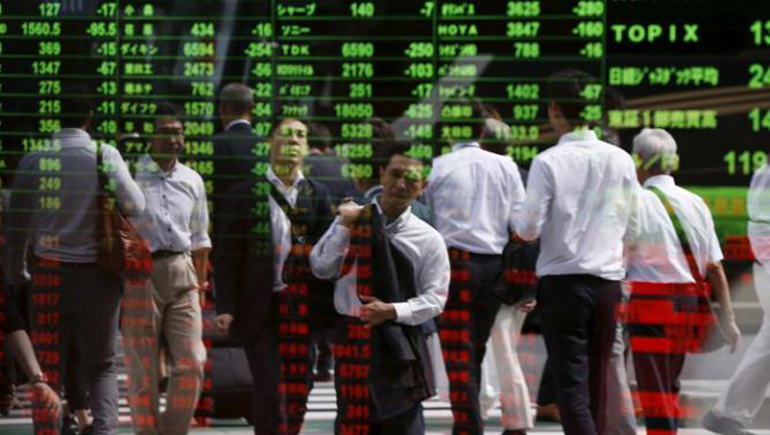Friday Feb 20, 2026
Friday Feb 20, 2026
Saturday, 14 November 2015 00:00 - - {{hitsCtrl.values.hits}}
 Reuters: Asian shares fell sharply on Friday after commodity prices tumbled to multi-year lows on worries that slower global growth may worsen a supply glut, while U.S. Federal Reserve officials kept drumming up the case for a rate hike next month.
Reuters: Asian shares fell sharply on Friday after commodity prices tumbled to multi-year lows on worries that slower global growth may worsen a supply glut, while U.S. Federal Reserve officials kept drumming up the case for a rate hike next month.
MSCI’s broadest index of Asia-Pacific shares outside Japan dropped 1.5%, led by losses in resource shares. It was set for a weekly decline of 3.2%.
Japan’s Nikkei closed down 0.5%, snapping a seven-day winning streak, but remained on track for a weekly gain of 1.7%.
The Shanghai Composite index slipped 1.1%, and was poised to end the week flat.
The gloom in Asia is seen extending to European markets, with financial spreadbetters expecting Britain’s FTSE 100 to open about 0.5% lower, Germany’s DAX 0.6%, and France’s CAC 40 0.7%.
Copper, often seen as a good gauge of the world’s economic health because of its extensive industrial use, tumbled to a six-year low of $4,795.50 per ton, below its August trough. It was set for a 3.8% loss for the week, its fourth consecutive weekly drop. Oil prices tumbled to near the 6 1/2-year lows touched in August, when financial markets were gripped by fear of a hard landing for the Chinese economy.
US crude futures CLc1 hovered around a 2-1/2 month low of $41.54 per barrel on a persistent rise in US stockpiles, and were poised for a 6.3% decline for the week.
Brent crude futures fell 3.9% on Thursday to $44.04 per barrel, edging near their 6 1/2-year low of $42.23. They last stood at $44.05, eyeing a weekly drop of 7.1%.
“The oil stockpile kept rising. U.S. crude futures look set to test, and will probably fall below, $40. Data from China so far this week is showing no sign that growth might be picking up,” said Masahiro Ichikawa, senior strategist at Sumitomo Mitsui Asset Management.
Gold edged back up to $1,082.06 from a six-year low of $1,074.30 per ounce, extending its loss so far this month to 5.3%.
Various Fed officials on Thursday lined up behind a likely December interest rate hike.
Stanley Fischer, the Fed’s second-in-command, said U.S. inflation should rebound next year, noting that the central bank could move next month to raise interest rates.
New York Fed President William Dudley said the risk of waiting too long was now roughly in balance with the risk of moving too soon to normalize rates.
None of these factors, however, significantly moved interest rate futures, which are still pricing in a roughly 70% chance of a rate hike in December, pointing to investor concerns about potential downside risks to the world economy.
Energy shares led the U.S. S&P 500 Index to post its biggest fall since late September to a three-week low.
MSCI’s ACWI, the index compiler’s broadest gauge of world shares covering 46 markets fell to its lowest level in a month, having slipped 3.3% from its 2 1/2-month high touched on Nov 4.
In a sign of rising market stress, the CBOE volatility index rose to a one-month high of 18.50.
“Are we seeing the market putting the August-September macro conditions back in the microwave and hitting reheat? It certainly feels that way,” Evan Lucas, market strategist at trading platform provider IG in Melbourne, wrote in a note.
The dollar index, which tracks the U.S. currency against a basket of six of its major peers, edged back from Tuesday’s seven-month high of 99.50 to last trade at 98.776.
The dollar edged up 0.1% to 122.69 yen JPY=, off Monday’s 2 1/2-month peak of 123.60, as risk appetite receded.
The euro slipped 0.4% to $1.0773, extending Thursday’s drop to $1.0691 after European Central Bank chief Mario Draghi singled out the currency’s more robust performance since May as one driver for a “weakening” outlook on inflation.
The Australian dollar remained resilient despite the commodities tumble, holding steady at $0.7122 following Thursday’s 0.9% jump after a stronger-than-expected jobs report reduced the likelihood of an interest-rate cut.
Friday will see a deluge of global data, including euro zone countries’ GDP as well as U.S. retail sales figures.